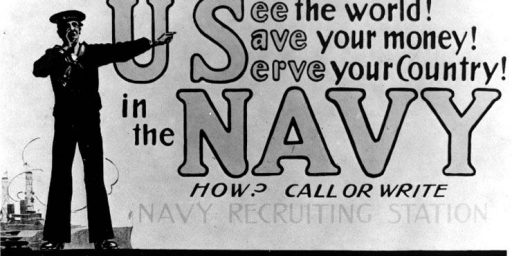Questioning Civilian Contractors
Columnist Gail Colllins asks “When did we decide that letting private contractors stand in for our military in sensitive and dangerous situations was a good plan?”:
When did we decide this was a good plan?
Let’s pretend for a minute that it is not stupendously irresponsible to let private contractors stand in for our military in wildly sensitive and dangerous situations abroad. Even if it was a terrific idea, we would still have to ask whether huge government agencies, which frequently have a difficult time finding cost-effective ways to order a hammer, know how to purchase services that actually work.
[…]
There’s no reason to believe the government has the capacity to determine how well all these private contractors are doing their jobs. And it’s doubtful that if the government did know, it could do much about it.
I’ll answer the question. We decided that using civilian contractors to perform functions that had previously been performed by soldiers in uniform was a good idea when we decided to reduce the size of our military without an accompanying commitment to reduce the number of things we’d be asking our military to do. In 1992 the end strengths of our military forces were:
| Army | 610,450 |
| Navy | 541,883 |
| Marines | 184,529 |
| Air Force | 470,315 |
In 2000 the end strengths of our military forces were:
| Army | 481,669 |
| Navy | 373,692 |
| Marines | 173,371 |
| Air Force | 354,321 |
Each president since then, William Clinton, George W. Bush, and Barack Obama, has decided to undertake new commitments without increasing the size of the military to the point that the commitments could be sustained. Once they’d decided to do that, the decision to hire civilian contractors to make up the difference was a foregone conclusion.
I have no problem with reducing the size of the military. I think that doing so without re-aligning commitments is irresponsible. I also think that civilian contractors should be held to the same standards of conduct that our soldiers in uniform are.





I thought it was obvious on 9-11-2001 that we needed to move to rapidly expand our military. Republicans had long complained that the military was undermanned. But Mr. Bush dithered for years as we opened two wars.
The forces that the Right had called inadequate for peacetime were now, suddenly, magically competent to fight two wars at once. And scarcely a Republican voice was to be heard demanding increases because they were all in thrall to that cretin Rumsfeld and to an ethos that rejected both reality and sacrifice. God forbid a Republican actually call for sacrifice just because we were attacked and heading off to war. No, no, it was all “Go shopping and spend your tax cut.”
Had we expanded the size of the military in the wake of 9-11 we’d at least have been able to keep sufficient forces in Afghanistan while building up in Iraq. And we might even have had a few extra brigades to maintain some semblance of order in occupied Iraq.
Rumsfeld has a lot to answer for, as do all those who assured us he was a genius.
Number one. All empires make use of Mercenaries do various jobs that their Regular military can’t cover for various reasons. The Roman’s for instance sent Germanic barbarians to the far corners of their empire. Among their many duties, they acted as body guard details for the various vassal kings that the Romans found useful to leave in place.(Sounds a little like Backwater doesn’t it?)
Number two. Most of these guys doing this sort of work are veterans of our military, and have considerably more combat experience, maturity,etc. Than do most of the still “Green” young troops in the active duty formations.
Three. The troop decline numbers you are seeing are only the start. Just as with Rome in the third and fourth centuries, we as a nation can not afford to maintain a standing army large enough to do the job.
Fourth. Just as it eventually happened to the fat and sleek Romans.If I were you,I would be prepared for one way or another,a Barbarian to show up at your personal gate in the not too distant future.
Highlander:
It took the Romans centuries to decline and fall. I don’t think our decline is imminent.
The Roman Empire didn’t fall because it lacked troops or even money. New scholarship points to a number of factors — the difficulty of communicating across what became two vast, separate empires, east and west; the loss of a qualitative military edge as opponents adapted to Roman tactics; internal political instability within the empire.
Maybe more to the point, no system endures forever, and the Romans made a damned good run of it. We’ve only been a major world power since the end of WW1 and a superpower only since WW2, six decades.
The “barbarians” we face now are not the equivalent of the various German tribes that bedeviled the Romans in the west, they are much closer to the sorts of nuisance threats the British in their colonial period would send a frigate to solve.
Genuinely existential threats may present themselves down the road, but none exists today. We have plenty of time to repair our finances — something the Roman Empire had to do fairly frequently, even at their peak.
Greetings:
I don’t disagree with the poster’s argument, but I would extend it back to the memorable year of A.D. 1973 when our legislators decided that they and America would do just fine without a military draft. I have a deep philosophical problem with a society proclaiming to its menfolk that they no longer have an individual responsibility to participate in its defense.
At the risk of appearing sophomoric, I would argue that our “volunteer” military is, in essence, a collection of people operating as individual contractors. Just because there isn’t an intervening or participating business organization does not mean that there isn’t a contract.
The people who are upset and or disturbed by the use of “contractors” are, more likely than not, those who are disturbed by our successes. As my favorite business school professor used to like to say, good management is what works. Amen to that.
Michael Mi Lad,
If I may paraphrase your statement,”The barbarians we face are not the equivalent of the Germanic tribes….but more like the nuisance threats in their colonial period that the British would send a frigate to take care of.”
To use one SMALL example of our IMPERIAL paralysis. That would be a nuisance threat along the line of oh shall we say…8 starving Somalia pirates in a leaking skiff capturing an ultra modern sailing vessel and its multimillion dollar cargo….in the mean time the hundreds of billions we spend yearly on the US Navy is powerless to stop these eight ignorant starving men? Think about the “emperor has no clothes” implications of that.
Our leadership elites left or right are in a state of moral and spiritual collapse( just as occurred in Rome)And compared to Rome we are on modern runaway fast forward. The United States as we know it has maybe 15 years to go. I’d advise keeping a goodly supply of dry powder of one kind or the other on hand. We are all going to need it.
Highlander:
There is a difference between being unable to deal with Somali pirates and not finding it necessary or profitable to do so. We could obliterate every Somali port city tomorrow at sunrise. We choose not to because it doesn’t make political or economic sense.
Your understanding of Rome and other empires may be a bit superficial. Rome and Britain both ignored minor nuisances which were not worth the diversion of resources, or for other political considerations. It would be irrational and foolish and absurdly expensive to rush madly about the globe blowing up everyone who irritated us.
There is not the slightest actual evidence of any sort of moral collapse on our part. In the last couple of decades we have intervened in Iraq (twice), Afghanistan, Haiti, Kosovo and Bosnia. We intervene semi-covertly in Pakistan. And probably others I’ve forgotten.
The United States still outspends any conceivable combination foes by orders of magnitude. We are still the only nation capable of projecting major force beyond our borders. Between us and our allies we spend virtually all of the world’s military budget, fly all the best jets, field all the best weaponry, and float all the best ships.
Your “moral collapse” is a fantasy. But then “moral collapse” had nothing much to do with the fall of Rome, either. That, too, is a fantasy designed to bolster a political ideology, not historical fact. The reality of Rome’s very slow-motion, multi-century collapse — and don’t please make the mistake of assuming that the western empire was the entirety of “Rome” — had many causes.
The reason that the military is smaller and entirely voluntary is the real lesson of Vietnam, which is that the public won’t stand for imperial adventures and conscription at the same time. In order to keep the maximum freedom of action, the politicians figured that a smaller volunteer military was a better solution than trying to keep the entire country in support of foreign adventures. In other words, they didn’t want to have to deal with wars being harder to justify, start and maintain. I’d argue that it’s not in the spirit of the Constitution, but I’m about a hundred years too late for that.
Rome’s elite had decadence issues centuries before its fall. I would say that the fall of Rome has more to do with its civilization slowly losing its dynamisim as it moved from republic to empire. As checks and balances eroded, the consequences of poor leadership were magnified. After Marcus Aurelius, well… Julian came a little too late, and died too early to make a difference.
The Roman republic was loaded with checks and balances, and their civilization soared to great heights (granted, at a vast cost in human suffering) When Rome turned away from its democratic principles, it started to fall. The empire was an indian summer… Rome’s greatest days were already behind it.
Perhaps some people are “upset and/or disturbed” by our “successes” but I’m sure many others are disturbed that contractors, in addition to seemingly being paid vastly more than our military personnel, also don’t always seem to have to follow the same standards of conduct applied to our military personnel…
or any standard at all…